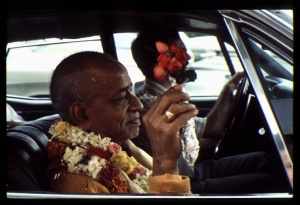CC Madhya 3.114: Difference between revisions
m (1 revision(s)) |
(Vanibot #0054 edit - transform synonyms into clickable links, which search similar occurrences) |
||
| (One intermediate revision by one other user not shown) | |||
| Line 1: | Line 1: | ||
{{ | [[Category:Sri Caitanya-caritamrta - Madhya-lila Chapter 03|C114]] | ||
<div style="float:left">'''[[Sri Caitanya-caritamrta|Śrī Caitanya-caritāmṛta]] - [[CC Madhya|Madhya-līlā]] - [[CC Madhya 3|Chapter 3: Lord Śrī Caitanya Mahāprabhu's Stay at the House of Advaita Acārya]]'''</div> | |||
<div style="float:right">[[File:Go-previous.png|link=CC Madhya 3.113|Madhya-līlā 3.113]] '''[[CC Madhya 3.113|Madhya-līlā 3.113]] - [[CC Madhya 3.115|Madhya-līlā 3.115]]''' [[File:Go-next.png|link=CC Madhya 3.115|Madhya-līlā 3.115]]</div> | |||
{{CompareVersions|CC|Madhya 3.114|CC 1975|CC 1996}} | |||
{{RandomImage}} | |||
==== TEXT 114 ==== | ==== TEXT 114 ==== | ||
<div | <div class="verse"> | ||
ki kahiba re sakhi ājuka ānanda ora | :ki kahiba re sakhi ājuka ānanda ora | ||
cira-dine mādhava mandire mora | :cira-dine mādhava mandire mora | ||
</div> | </div> | ||
| Line 12: | Line 16: | ||
==== SYNONYMS ==== | ==== SYNONYMS ==== | ||
<div | <div class="synonyms"> | ||
''[//vanipedia.org/wiki/Special:VaniSearch?s=ki&tab=syno_o&ds=1 ki]'' — what; ''[//vanipedia.org/wiki/Special:VaniSearch?s=kahiba&tab=syno_o&ds=1 kahiba]'' — shall I say; ''[//vanipedia.org/wiki/Special:VaniSearch?s=re&tab=syno_o&ds=1 re]'' — O; ''[//vanipedia.org/wiki/Special:VaniSearch?s=sakhi&tab=syno_o&ds=1 sakhi]'' — My dear friends; ''[//vanipedia.org/wiki/Special:VaniSearch?s=ājuka&tab=syno_o&ds=1 ājuka]'' — today; ''[//vanipedia.org/wiki/Special:VaniSearch?s=ānanda&tab=syno_o&ds=1 ānanda]'' — pleasure; ''[//vanipedia.org/wiki/Special:VaniSearch?s=ora&tab=syno_o&ds=1 ora]'' — the limit; ''[//vanipedia.org/wiki/Special:VaniSearch?s=cira&tab=syno_o&ds=1 cira]-[//vanipedia.org/wiki/Special:VaniSearch?s=dine&tab=syno_o&ds=1 dine]'' — after many days; ''[//vanipedia.org/wiki/Special:VaniSearch?s=mādhava&tab=syno_o&ds=1 mādhava]'' — Lord Kṛṣṇa; ''[//vanipedia.org/wiki/Special:VaniSearch?s=mandire&tab=syno_o&ds=1 mandire]'' — in the temple; ''[//vanipedia.org/wiki/Special:VaniSearch?s=mora&tab=syno_o&ds=1 mora]'' — My. | |||
</div> | </div> | ||
| Line 19: | Line 23: | ||
==== TRANSLATION ==== | ==== TRANSLATION ==== | ||
<div | <div class="translation"> | ||
Advaita Ācārya said, “‘My dear friends, what shall I say? Today I have received the highest transcendental pleasure. After many, many days, Lord Kṛṣṇa is in My house.’” | Advaita Ācārya said, “‘My dear friends, what shall I say? Today I have received the highest transcendental pleasure. After many, many days, Lord Kṛṣṇa is in My house.’” | ||
</div> | </div> | ||
| Line 26: | Line 30: | ||
==== PURPORT ==== | ==== PURPORT ==== | ||
<div | <div class="purport"> | ||
This is a song composed by Vidyāpati. Sometimes the word mādhava is misunderstood to refer to Mādhavendra Purī. Advaita Ācārya was a disciple of Mādhavendra Purī, and consequently some people think that He was referring to Mādhavendra Purī by using the word mādhava. But actually this is not the fact. This song was composed to commemorate the separation of Kṛṣṇa from Rādhārāṇī during Kṛṣṇa’s absence in Mathurā. It is thought that this song was sung by Śrīmatī Rādhārāṇī when Kṛṣṇa returned. It is technically called Mathurā-viraha. | This is a song composed by Vidyāpati. Sometimes the word ''mādhava'' is misunderstood to refer to Mādhavendra Purī. Advaita Ācārya was a disciple of Mādhavendra Purī, and consequently some people think that He was referring to Mādhavendra Purī by using the word ''mādhava''. But actually this is not the fact. This song was composed to commemorate the separation of Kṛṣṇa from Rādhārāṇī during Kṛṣṇa’s absence in Mathurā. It is thought that this song was sung by Śrīmatī Rādhārāṇī when Kṛṣṇa returned. It is technically called ''Mathurā-viraha''. | ||
</div> | </div> | ||
__NOTOC__ | |||
<div style="float:right; clear:both;">[[File:Go-previous.png|link=CC Madhya 3.113|Madhya-līlā 3.113]] '''[[CC Madhya 3.113|Madhya-līlā 3.113]] - [[CC Madhya 3.115|Madhya-līlā 3.115]]''' [[File:Go-next.png|link=CC Madhya 3.115|Madhya-līlā 3.115]]</div> | |||
__NOTOC__ | |||
__NOEDITSECTION__ | |||
Latest revision as of 23:20, 19 February 2024

A.C. Bhaktivedanta Swami Prabhupada
TEXT 114
- ki kahiba re sakhi ājuka ānanda ora
- cira-dine mādhava mandire mora
SYNONYMS
ki — what; kahiba — shall I say; re — O; sakhi — My dear friends; ājuka — today; ānanda — pleasure; ora — the limit; cira-dine — after many days; mādhava — Lord Kṛṣṇa; mandire — in the temple; mora — My.
TRANSLATION
Advaita Ācārya said, “‘My dear friends, what shall I say? Today I have received the highest transcendental pleasure. After many, many days, Lord Kṛṣṇa is in My house.’”
PURPORT
This is a song composed by Vidyāpati. Sometimes the word mādhava is misunderstood to refer to Mādhavendra Purī. Advaita Ācārya was a disciple of Mādhavendra Purī, and consequently some people think that He was referring to Mādhavendra Purī by using the word mādhava. But actually this is not the fact. This song was composed to commemorate the separation of Kṛṣṇa from Rādhārāṇī during Kṛṣṇa’s absence in Mathurā. It is thought that this song was sung by Śrīmatī Rādhārāṇī when Kṛṣṇa returned. It is technically called Mathurā-viraha.